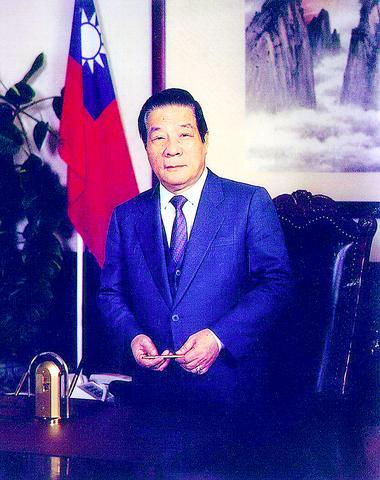Tsai Wan-lin (
Despite his family background, Tsai rose out of destitution to became one of the nation's legends -- one of those who have developed massive enterprises from scratch.

TAIPEI TIMES FILE PHOTO
At the age of eight, Tsai followed his elder brother, Tsai Wan-chun (
His business career started to take off after he established the Cathay Life Insurance Corp (
Cathay Life later become the flagship of Cathay Financial Holdings Co (國泰金控) and the group's main earnings contributor. At the end of June, Cathay Life accounted for 62 percent of Cathay Financial's consolidated assets of NT$2.5 trillion and 58 percent of the financial service company's capital of NT$146.7 billion, according to Taiwan Ratings Corp's (中華信評) statistics.
The family's financial group split in 1979 and in 1985, Tsai Wan-lin formed the Lin Yuan Group (
The group later evolved to include Symphox Information Co (
Earlier this year, Tsai and his family were estimated to hold assets worth US$4.6 billion, ranking 94th richest in the world, according to a Forbes report published in February. The nation's richest man had ranked 88th, 68th and 104th in the magazine's list in the previous three years.
Tsai Wan-lin moved to keep the business in the family. When he was 66, he began to make arrangements for his succession, putting his four sons in the business.
Currently, his second son, Tsai Hong-tu (
His third son, Tsai Cheng-yu (
Tsai's success in amassing a fortune out of nothing came from his bold yet precise investments in real estate. Cathay Life owns 230 buildings nationwide, with many located in prosperous downtown areas such as Taipei Main Station. These buildings contribute billions of NT dollars in rent every year, according to local media reports.
Tsai Wan-lin's younger brother, meanwhile, Tsai Wan-tsai (蔡萬才), is the fifth richest man in the nation, ranking 231 on the Forbes list this year, with US$2.3 billion in assets. Tsai Wan-tsai heads Fubon Financial Holding Co (富邦金控), the fifth-biggest financial services company with NT$1.26 trillion in assets last year.
Relations between the brothers had been strained for most of last 20 years, however, due to a financial scandal involving their nephew, Tsai Chern-chou (
In 1985, Tsai Chern-chou became embroiled in a controversy after embezzling over NT$7.8 billion from the 10th Credit Cooperative of Taipei (
On the business front, the brothers were rivals as well. The Cathay and Fubon groups have competed for dominance in the financial market.

Nvidia Corp chief executive officer Jensen Huang (黃仁勳) on Monday introduced the company’s latest supercomputer platform, featuring six new chips made by Taiwan Semiconductor Manufacturing Co (TSMC, 台積電), saying that it is now “in full production.” “If Vera Rubin is going to be in time for this year, it must be in production by now, and so, today I can tell you that Vera Rubin is in full production,” Huang said during his keynote speech at CES in Las Vegas. The rollout of six concurrent chips for Vera Rubin — the company’s next-generation artificial intelligence (AI) computing platform — marks a strategic

Enhanced tax credits that have helped reduce the cost of health insurance for the vast majority of US Affordable Care Act enrollees expired on Jan.1, cementing higher health costs for millions of Americans at the start of the new year. Democrats forced a 43-day US government shutdown over the issue. Moderate Republicans called for a solution to save their political aspirations this year. US President Donald Trump floated a way out, only to back off after conservative backlash. In the end, no one’s efforts were enough to save the subsidies before their expiration date. A US House of Representatives vote

REVENUE PERFORMANCE: Cloud and network products, and electronic components saw strong increases, while smart consumer electronics and computing products fell Hon Hai Precision Industry Co (鴻海精密) yesterday posted 26.51 percent quarterly growth in revenue for last quarter to NT$2.6 trillion (US$82.44 billion), the strongest on record for the period and above expectations, but the company forecast a slight revenue dip this quarter due to seasonal factors. On an annual basis, revenue last quarter grew 22.07 percent, the company said. Analysts on average estimated about NT$2.4 trillion increase. Hon Hai, which assembles servers for Nvidia Corp and iPhones for Apple Inc, is expanding its capacity in the US, adding artificial intelligence (AI) server production in Wisconsin and Texas, where it operates established campuses. This

US President Donald Trump on Friday blocked US photonics firm HieFo Corp’s US$3 million acquisition of assets in New Jersey-based aerospace and defense specialist Emcore Corp, citing national security and China-related concerns. In an order released by the White House, Trump said HieFo was “controlled by a citizen of the People’s Republic of China” and that its 2024 acquisition of Emcore’s businesses led the US president to believe that it might “take action that threatens to impair the national security of the United States.” The order did not name the person or detail Trump’s concerns. “The Transaction is hereby prohibited,”